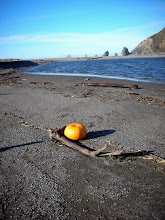
The Omnivore's Dilemma is one of those big picture, eye-opening books. Journalist Michael Pollan expertly weaves his way through the morass of industrial agriculture, box-store organics which appear on the surface to offer a better way to eat, and into the world of local organics, before detailing his own journey into a personally hunted and gathered meal. I found the entire book fascinating.
Did you know that more than 60% of all the industrially-created and processed food we eat comes from corn? From the corn-fed beeves and chickens to purt near all our processed food, (including nearly the entire McDonald's menu), our glut of cheap, government-subsidized corn has become the hidden foundation of every American's diet. And thanks to these corn-based diets, we have a surplus of obesity (consider those beautifully marbled ribeyes and the chicken's artificially large American breasts), diabetes, and heart attacks, not to mention polluted rivers and farmlands, farmers on welfare, and wars for oil.
Do you realize the environmental costs of the burgeoning organic foods now so readily available in our "whole food" supermarket chains and in the neighborhood Safeway? When measured in transportation and packaging costs (read petrochemical costs), the impacts are very nearly the same as foods grown in the industrial food chain. Sure, they'll be slightly better for you healthwise, but the costs to the planet are just as high.
I had hoped for this kind of measured expose when I read Fast Food Nation a few years ago (though it didn't effectively get me to kick the fast food habit). Pollan has convinced me of the value - both to my own health and that of the planet - of eating foods made, grown, and created locally. Since beginning this book, I've made more trips to the local farmer's market and scanned the cards at the local co-op more diligently to see where my food is coming from. I'm convinced now that it matters. I'm trying to limit the Safeway & Costco visits to toilet paper, toothpaste, and Cheezits. Now I'm considering how to put together my Thanksgiving meal with all local foodstuffs. Go ahead...add a challenge to a full day's cooking!
Now I'll not step out and say I'm a full-blown convert and become entirely local and organic. I know I'll still drive-thru for the occasional double cheeseburger value meal. And I'm not gonna quiz the waiter at the local eatery on what the chicken ate before I ate the chicken. It's all in perspective. But Pollan has convinced me that our food's provenance matters. If we are what we eat, we should try to know a little something about where what we eat came from. That shouldn't be so hard.
Anyone up for some Brio sourdough with Humboldt Creamery butter alongside the Willow Creek Farms cherry tomatoes and Cypress Grove Chevre?



No comments:
Post a Comment